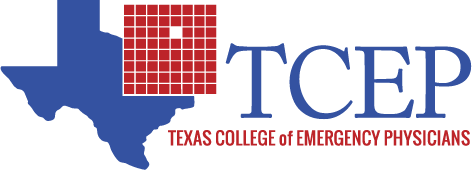Legal Update
December 2020

Kenneth Alan Totz, DO, JD, FACEP
Are Your Peer Review Committee Proceedings Subject to Discovery?
Background:
The Texas Occupations Code, §160.007 (§160.007), houses the set of circumstances under which the medical peer review privileges apply. Relevant portions of §160.007 applicable to Texas emergency physicians and a recent case challenging the statute will be discussed below:
- Except as otherwise provided by this subtitle, each proceeding or record of a medical peer review committee is confidential, and any communication made to a medical peer review committee is privileged.
- A record or proceeding of a medical peer review committee or a written or oral communication made to the committee may be disclosed to:
- Another medical peer review committee; or
- An appropriate state or federal agency; or
- A national accreditation body; or
- The Medical Board; or
- Disclosure to an affected physician of confidential peer review committee information relevant to the matter under review does not constitute waiver of the confidentiality requirements; or
- The state board of registration or licensing of physicians of another state; or
- Unless disclosure is required or authorized by law, a record or determination of or a communication to a medical peer review committee is not subject to subpoena or discovery and is not admissible as evidence in any civil judicial or administrative proceeding without waiver of the privilege of confidentiality executed in writing by the committee; or
- A person participating in peer review, a medical peer review committee, or a health care entity named as a defendant in a civil action filed as a result of participation in peer review may use otherwise confidential information in the defendant’s own defense.
- A person seeking access to privileged information must plead and prove waiver of the privilege. A member, employee, or agent of a medical peer review committee who provides access to an otherwise privileged communication or record in cooperation with a law enforcement authority in a criminal investigation is not considered to have waived any privilege.
The Case: Debra Hoedebecke v. Christus Santa Rosa Health Care Corp., et al.
On September 2, 2020 The Texas Fourth Court of Appeals in San Antonio handed down a clarifying and protective ruling for the Texas Medical Peer Review Privilege. The case was entitled, Debra Hoedebecke v. Christus Santa Rosa Health Care Corp., et al. At issue, were scathing emails sent by general surgeon, Dr. Patrick Nguyen, to the hospital staff, shortly after his patient, Ms. Hoedebecke, was awakened from emergency surgery. Ms. Hoedebecke had been transferred to the hospital approximately 47 hours before the admitting physician placed a consult to Dr. Nguyen. Shortly after Dr. Nguyen saw Ms. Hoedebecke, he scheduled emergency surgery. Dr. Nguyen was so upset about the untimeliness of his consult that he shared portions of his contemptuous emails with Ms. Hoedebecke when she awakened from surgery. Ms. Hoedebecke further alleged that Dr. Nguyen encouraged her to sue her admitting physician and hospital for their negligent delay in surgical consultation; and she did!
During the discovery process, Ms. Hoedebecke’s attorneys requested copies of the emails sent to the hospital administration by Dr. Nguyen. Following a motion to compel production of the emails by Hoedebecke’s attorneys, the defendants refused to produce a copy of the emails, asserting peer review privilege. Hoedebecke’s attorneys claimed the peer review privilege had been waived when Dr. Nguyen shared the email contents with her following surgery. The trial court agreed with Hoedebecke and granted the motion to compel. The defendants appealed the ruling to the Court of Appeals, requesting they clarify if the peer review privilege had in fact been waived.
Hoedebecke asserted to the Court of Appeals the following three issues for consideration: (1) The emails were not privileged because they were sent before the peer review process began, (2) The emails were not sent to everyone on the hospital’s peer review committee, and (3) Any privilege was waived because the emails were shared with third parties (i.e. herself). The following are synopses of the Court’s analyses of each issue:
- Was peer review privilege lost because the emails were sent before the peer review process had begun?
- Hoedebecke concludes that Dr. Nguyen’s email could not be cloaked by privilege as she asserted the peer review process had not yet begun when Dr. Nguyen sent his emails. The defendants countered by claiming the peer review process must start somewhere, and in this case, it started with the emails. The Court further opined that, “Even a ‘gratuitous’ communication to a peer review committee about the qualifications of a physician or the quality of health care provided by that physician is within the scope of §160.007.” The defendants then elaborately laid out their peer review infrastructure in place; from the establishment of a board of directors of the entire hospital system, to bylaws that establish the individual hospital peer review committees that oversee the peer review processes. In the end, the Court concluded that, “The privilege from discovery under §160.007 is not restricted to communications to a medical peer review committee during the course of a specific investigation or an ongoing proceeding” (emphasis added).
- Was the peer review privilege lost because Dr. Nguyen’s email was not sent to every member of the peer review committee?
- Dr. Nguyen’s emails were sent to the hospital’s chief medical officer, president, chief nursing officer, the chief of bariatric surgery, and the department chair of surgery-all of whom are on the peer review committee. The defendants argued that neither §160.007, nor the hospital’s peer review policy requires a communication to be sent to every member of a peer review committee. The Court cited excerpts from Brooks, 927 S.W.2d at 19, that conveyed in part, “Reading additional requirements into the statute (§160.007 ) would drastically alter its scope and severely hamper its purpose, as well as deprive a medical peer review committee of sources of information it may need to make informed decisions.” With this in mind, the Court concluded there was no statutory requirement that Dr. Nguyen send his email(s) to every member of the peer review committee for peer review privilege to apply.
- Was the peer review privilege lost because Dr. Nguyen’s email was shared with individuals that do not come under the umbrella of §160.007?
- Hoedebecke argued that any privilege was waived for two reasons: First, she contended that although Dr. Nguyen did not show her his specific emails, he conveyed to her their “essence.” Second, she argued another doctor, Dr. Trawick, was on later email chains making him privy to the entire email chain about which the defendants claims privilege. Thus, Hoedebecke asserted that because Dr. Nguyen conveyed the “essence” of his email to her and because the email itself was shared with third parties, the email never became privileged.
- The Court concluded that the privilege was not waived because Dr. Nguyen read Hoedebecke a few words from his emails. The Court also asserted that Hoedebecke did not bring up the issue of Dr. Trawick and his being outside of the chain of persons in the peer review process during the trial court proceedings. As a matter of law, the Court conveyed, issues not brought before the trial court proceedings cannot be a matter of appellate review.
- Summarily, the Court asserted that a few words of disclosure by Dr. Nguyen in his emails would not enable the source of further discovery to be form the peer review committee or any other entity or individual included within the protections of §160.007, unless there had been a waiver of that privilege. The Court contended that a party must seek any privileged documents or communications from non-privileged sources and that all communications to and proceedings of a medical peer review committee are confidential and protected from discovery unless waived in writing. Here, the Court noted the defendant’s peer review committee did not waive the privilege in writing and concluded the peer review privilege was not waived. In its conclusory opinion, the Appellate Court stated that the trial court had abused its discretion by compelling disclosure of privileged material and directed the trial court to vacate that portion of its June 19, 2020 order consistent with the opinion therein.
Lessons learned from this case:
- Hospital bylaws should be in place establishing a peer review committee, the members of the committee, and the confidential nature of the committee consistent with §160.007.
- Any communications to or from the peer review committee should be construed as privileged.
- Hospital bylaws should establish that applicable communications to or from any or all members of the peer review committee should be considered privileged.
- Peer review privilege may only be waived, in writing, by a member of the peer review committee.
- Lastly, there is a very concerning case working its way through the courts in Pennsylvania whereby a plaintiff’s attorney is attempting to gain access to a physician’s credentialling documents. We will soon see if the Pennsylvania courts deem the information privileged or if the floodgates of discovery will be opened. I will keep you informed as the case progresses.
Kenneth Alan Totz, DO, JD, FACEP
No information within this publication should be construed as medical or legal advice. Independent medical and/or legal advice should be sought based on each individual’s particular circumstances.
|

